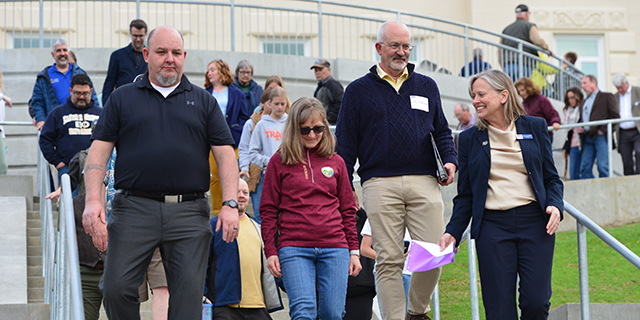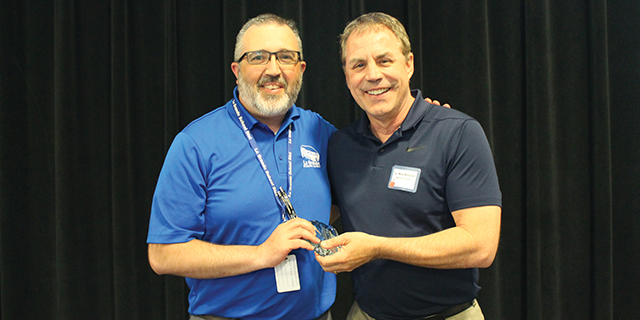Joseph council, board hash out library concerns
Published 1:00 pm Wednesday, October 25, 2023

- The Blackburn Building at N. 100 East St. in Joseph is seen in this file photo. Plans are to use the building as the new home of the Joseph City Library.
JOSEPH — Joseph’s elected officials peppered advocates of a new city library with questions about the project’s cost at a work session of the city council on Monday, Oct. 23.
But at the end of a two-hour session, participants on both sides agreed that the answers to the questions had helped to reopen lines of communication between the council and the city’s library board, which has been working on the project since 2021.
No official action was taken during the work session — any such action will have to wait for the council’s November meeting — but Mayor Lisa Collier proposed creating a committee with two or three councilors and an equal number of library proponents to help keep those lines of communication open and to consider potential areas of compromise on the project.
The city plans to move its library, now located in cramped quarters in city hall, to the 1,600-square-foot Blackburn Building, just down the hill from Joseph Charter School. The former medical office is being remodeled, but proponents need to find additional funding for the project. The idea is to remodel the current library space for council chambers and for the city’s court.
The work session came in the wake of the council’s Oct. 5 meeting, during which library proponents updated the council on the project and the fundraising efforts.
Two hours later, at the end of that meeting, after the library proponents had left, Collier and councilors expressed concern about the price tag of the project, which is close to $1 million — although roughly $450,000 of that has been raised already, largely from city donations of the building and work on the site.
At the end of the Oct. 5 council meeting, Collier said that she would arrange a work session between the council and the library board.
In preparation for the work session, members of the library board emailed documents about the project to city officials — and Collier solicited questions from councilors to be asked of library proponents.
The first question Collier asked was this one: Why did you pitch such an expensive design, when a less-expensive design could have served the community just as well?
Jim Nave, a civic engineer with Enterprise’s Devco Engineering — and someone who’s worked on the project since 2022 — explained that library proponents did not start with a specific price tag in mind, but rather built their plans around what members of the public said they wanted in a new library, based on the results of a community survey.
A frequent request, he said, was for more natural light — which resulted in a design using enlarged “window boxes” designed in part to bring natural light deep into the interior of the building.
Another major cost driver, Nave said, is the need to rework the building’s entryway so that it meets Americans With Disabilities Act requirements.
The need for the revised entryway wasn’t controversial. But councilors continued to express concerns about the window boxes and the additional costs they might entail.
John Dundas, the newest member of the council and the owner of a construction company, recommended the use of tubular skylights, which could be less expensive than the expanded windows but just as effective at moving natural light into the building. Other councilors worried about how the expanded windows would be insulated against the winter cold. Other concerns focused on the building’s roof, which could allow ice and snow to slide off, creating potential safety hazards.
Councilors also expressed worries about the fundraising work required for the project.
Estimates are that another $408,926 is needed to get the building ready for occupancy and $122,323 would be needed for additional site enhancements such as landscaping. Those estimates include 23% for inflation and contingencies. In theory, those site enhancements could be delayed if necessary if fundraising doesn’t go as planned.
Sara Miller, of the Northeast Oregon Economic Development District, which has contracted with the city to help with library fundraising, said that potential major funders such as the Ford Family Foundation have expressed interest.
Near the meeting’s end, Nave expressed regret that library proponents had not routinely briefed the council on their progress.
“We’ve all been working on this for a long time and I think one error we’ve made was that we wanted to come to you with a complete plan,” he said. “And I think one error we made is that we probably should have been coming to you every three months (to say) ‘Here’s where we’re at. What do you think?'”
Dan Larman, the city’s adminstrator, took some of the blame for that: He said the idea to wait for a complete plan “was my recommendation, just so everybody knows. Those guys don’t need to take the heat.”
Collier recommended that the proposed committee initially focus on questions around the building’s roof, the proposed window boxes and the possibility of adding tubular skylights.
And she said the work session had been “so helpful. I know you have a passion for the library. I know you’ve all been working hard. There’s a lot of stuff we don’t know; I get that. We want a city asset that we can be super-proud of, too.”





